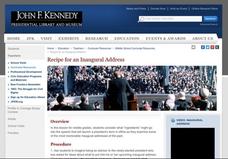School Improvement in Maryland
Types of Economic Systems
As an introduction to economics, government classes investigate different types of economic systems (traditional, command, market or capitalist, mixed) to determine answers to basic question about how goods are produced.
iCivics
Municipal Government: High School
Municipal government takes on many roles, not just the ones we are used to hearing about such as Parks and Recreation. Scholars delve into the topic to get a grasp on how the government system functions. They participate in readings,...
Curated OER
Lesson 4: The Judiciary: A Brief Introduction to the Courts System
Focusing on the judicial branch of government, the fourth lesson in this series explores the structure of the US courts system. Beginning with an engaging activity based on the short story The Lady or the Tiger, students go on to examine...
PBS
Reading Adventure Pack: Government
A reading adventure pack looks closely at government with the help of two books—one fiction, one nonfiction, and a series of activities. Learners craft a mobile to visualize a balanced government, participate in a scavenger hunt around...
iCivics
Tribal Government: High School
Did you know there are 567 federally recognized American Indian and Native Alaskan tribes and villages in the United States alone? The resource helps break down the complexities of many different tribal societies to explain the concept...
School Improvement in Maryland
Political Systems: Advantages and Disadvantages
Every political system has advantages and disadvantages. To gain an understanding of these differences, groups investigate the political system of another country—oligarchy, monarchy, dictatorship, parliamentary—and prepare a...
Judicial Learning Center
Types of Court Cases
How can one court acquit someone of a crime, while another convicts the person of the same one? It's all because of the differences between civil and criminal trials. An informative resource provides scholars in the field of criminology...
Judicial Learning Center
Levels of the Federal Courts
The Supreme Court gets all the glory, but very few federal cases make it to the highest court. An interesting lesson explores the structure of the lower levels of the federal court system. In addition to outlining the organization of...
Delegation of the European Union to the United States
Structure of Government within the EU
The political system of the European Union is historically unique and has been constantly evolving. To better understand the structure of the EU, class members compare the EU's branches to those of the United States Federal Government.
School Improvement in Maryland
Court Proceedings Civil Cases
What's the difference between civil and criminal law? How do the court proceedings differ in these two types of trials? How do the standards of proof differ? Why do these differences exist? As part of their examination of the US court...
Judicial Learning Center
State Courts vs. Federal Courts
Popular culture often portrays the Feds as the most fearsome of law enforcement agencies. Yet, someone charged with a crime is considerably more likely to end up in a state court. The lesson, one of six covering the Organization of the...
Judicial Learning Center
The Appeal Process
Why doesn't the Supreme Court hear testimony from witnesses? How do they complete an entire proceeding in less than two hours? A helpful lesson guides scholars of criminology through these and other questions by explaining how appeals...
Judicial Learning Center
About Federal Judges
Not just anybody can do the job of a federal judge, but according to the United States Constitution just about anybody can be appointed. The lesson outlines the process and requirements for becoming a federal judge, focusing on the...
Judicial Learning Center
The Judge and the Jury
Unless you are a lawyer, you might not understand just how unrealistic Law and Order and other legal dramas actually are. Here's a great resource to help scholars of criminology gain a more realistic perspective. The lesson outlines the...
Utah State Courts
Judges in the Classroom
Class members explore the process of a disposition hearing for juveniles, particularly looking at how the judge decides what sentence the juvenile offender should receive. Task your pupils with evaluating different sample cases provided...
School Improvement in Maryland
Executive Order
After reading information about Executive Order #9066, class members assume the voice of an 18 year-old Japanese-American born in California and placed in an internment camp. Individuals then craft a letter to President Roosevelt...
Curated OER
Ancient River Valley Civilizations
Ziggurats, cuneiform writing, the Tower of Babel, hieroglyphics, pyramids, the Great Wall. Launch a unit on ancient cultures, with a presentation that introduces viewers to ancient Mesopotamia, Babylonia, Sumer, Egypt, Indus, and China....
John F. Kennedy Presidential Library & Museum
Recipe for an Inaugural Address
An inaugural address represents the first moments of a new beginning. Using John F. Kennedy's speech as a model for guided practice, groups examine the ingredients of an inaugural address. Individuals then repeat the analysis process...



















